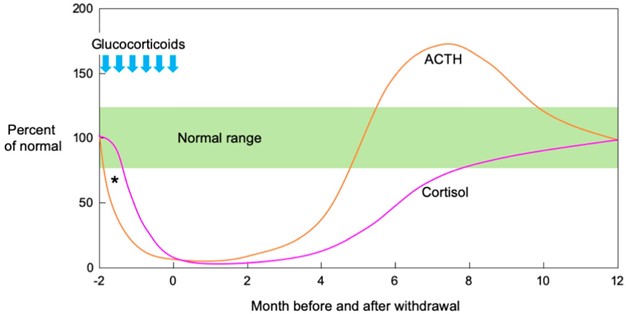A nurse is teaching a client who has been taking prednisone to treat asthma and has a new prescription to discontinue the medication. The nurse should explain to the client to reduce the dose gradually to prevent which of the following adverse effects?
Rebound pulmonary congestion
Hyperglycemia
Adrenocortical insufficiency
Severe dehydration
The Correct Answer is C
Prednisone is a corticosteroid medication commonly used to treat asthma and other inflammatory conditions. When taken for a prolonged period at higher doses, it can suppress the body's natural production of cortisol, a hormone produced by the adrenal glands. Abruptly stopping prednisone after long-term use can lead to adrenocortical insufficiency, also known as adrenal insufficiency or adrenal crisis.
Adrenocortical insufficiency occurs because the body's adrenal glands need time to resume normal cortisol production after being suppressed by prednisone. Gradually reducing the dose of prednisone allows the adrenal glands to gradually increase their cortisol production, minimizing the risk of adrenal insufficiency.
Rebound pulmonary congestion, hyperglycemia, and severe dehydration are not specific adverse effects associated with discontinuing prednisone. However, it is important for clients who have been taking prednisone to follow their healthcare provider's instructions regarding the tapering schedule and any potential risks or side effects.

Nursing Test Bank
Naxlex Comprehensive Predictor Exams
Related Questions
Correct Answer is C
Explanation
Prednisone is a corticosteroid medication commonly used to treat asthma and other inflammatory conditions. When taken for a prolonged period at higher doses, it can suppress the body's natural production of cortisol, a hormone produced by the adrenal glands. Abruptly stopping prednisone after long-term use can lead to adrenocortical insufficiency, also known as adrenal insufficiency or adrenal crisis.
Adrenocortical insufficiency occurs because the body's adrenal glands need time to resume normal cortisol production after being suppressed by prednisone. Gradually reducing the dose of prednisone allows the adrenal glands to gradually increase their cortisol production, minimizing the risk of adrenal insufficiency.
Rebound pulmonary congestion, hyperglycemia, and severe dehydration are not specific adverse effects associated with discontinuing prednisone. However, it is important for clients who have been taking prednisone to follow their healthcare provider's instructions regarding the tapering schedule and any potential risks or side effects.

Correct Answer is C
Explanation
This response demonstrates that the patient understands the dosing frequency (twice a day) and the importance of taking it with a full glass of water, which aligns with the instructions provided by the nurse.
The other choices are incorrect because:
A. "Taking this medication can cause me to develop a non-productive cough.": This response is about a potential side effect of the medication, rather than showing an understanding of the dosing instructions.
B. "I will take my medication Daily with a full glass of water.": This response indicates a misunderstanding of the dosing frequency, as the prescription specifically states "BID" (twice a day) rather than "daily."
D. "The medication will have to be given by my Home Health Nurse twice a day.": This response suggests a reliance on the home health nurse to administer the medication, which contradicts the instructions for the patient to take it themselves. It shows a misunderstanding of the patient's responsibility in self-administering the medication.
Whether you are a student looking to ace your exams or a practicing nurse seeking to enhance your expertise , our nursing education contents will empower you with the confidence and competence to make a difference in the lives of patients and become a respected leader in the healthcare field.
Visit Naxlex, invest in your future and unlock endless possibilities with our unparalleled nursing education contents today
Report Wrong Answer on the Current Question
Do you disagree with the answer? If yes, what is your expected answer? Explain.
Kindly be descriptive with the issue you are facing.
